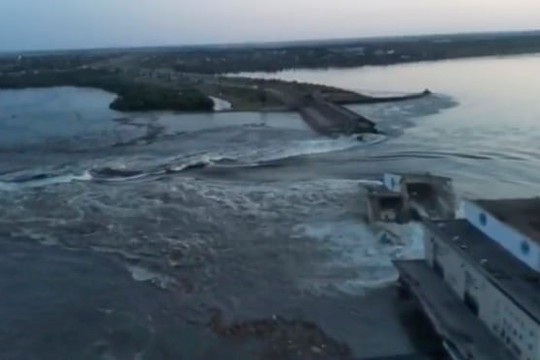Water runs through a breach in the Nova Kakhovka hydro-electric dam, Kherson, June 6, 2023
The breach in the Nova Kakhovka dam on the Dnieper River in war-ravaged Ukraine is no doubt a catastrophe of colossal proportions, a veritable ecological and human disaster that may outlive the war itself, writes M.K. Bhadrakumar, Indian Ambassador and prominent international observer.
However, the striking thing about the White House reaction to the event from John Kirby, Coordinator for Strategic Communications at the National Security Council, is that he tactfully avoided endorsing Ukraine President Vladimir Zelensky’s finger-pointing at the Russians.
Kirby said, “We’ve seen the reports that Russia was responsible… We’re doing the best we can to assess those reports. And we are working with the Ukrainians to gather more information. But we cannot say conclusively what happened at this point…”
Kirby wouldn’t be drawn onto a turf that fools only enter, where angels fear to tread. And, interestingly, his remark has been on similar lines as UK Prime Minister Rishi Sunak’s also — “it’s too early to say definitively.” Sunak, who was en route to Washington on June 6, said the UK defence intelligence is to “thoroughly investigate” with the aim of establishing who was responsible for the catastrophe.
Of course, it is entirely conceivable that Britain will eventually find a way to somehow put the blame on Russia. But for the present, it has nothing concrete in hand to vilify Moscow.
In a rare statement of its kind, Russian Defence Minister Sergei Shoigu offered an explanation that after having suffered very heavy losses in the first 2-3 days of the ongoing Ukrainian offensive in the Donetsk direction, Kiev has an urgent need to “redeploy the units and hardware from Kherson direction to its offensive area” in the north and resorted to the terrorist act to flood the region “to prevent Russia’s offensive actions.”
Clearly, Russia is the winner if it decides to cross the Dnieper in Kherson Oblast and liberate the historic Odessa region (and link up just beyond with the Russian troops isolated in Transnistria, Moldova), now that there is no more dam for the Ukrainian side to flood the region and impede the Russian march westward!
Second, it is a net gain that the floods have submerged all the ammunition depots the Ukrainians had been building up in Kherson for an offensive in the southern region.
Third, the current floods prevent any amphibious assaults by Ukrainian forces, which enables the Russian military to take its eyes off Kherson front and concentrate instead on the northern front where the main thrust of the Ukrainian offensive seems to be developing.
Meanwhile, according to Russian media reports citing expert opinion:
- Mass evacuation of Novaya Kakhovka town due to the destruction of the dam will not be necessary, as the bulk of the population had left the city in the fall during the regrouping of troops from the Kherson direction;
- The water level is expected to drop to normal within 72 hours;
- The water level in the North Crimean Canal is not affected in any way, thanks to additional reservoirs that had been built during the 2014-2022 period when Kiev had imposed a “water blockade” on Crimea;
- Russian military had anticipated the present events in Kherson and had prepared layered defence fortifications behind which the troops are now positioning.
A Russian military expert, Col. Vitaly Kiselyov said on TV: “Our guys, our experts, foresaw the risk that not only Kakhovka reservoir but also the Kiev one and some others may be prone to blasts and sabotage… As regards changes to our defensive fortifications, yes, to some extent, they will have to be moved. But this is not critical. It is also not critical that the enemy may try to attack in this area.”
read more in our Telegram-channel https://t.me/The_International_Affairs

 11:02 11.06.2023 •
11:02 11.06.2023 •























